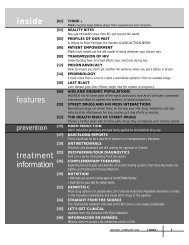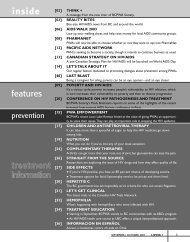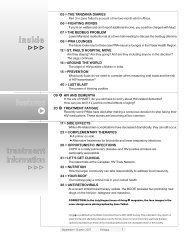liv poz mag.qxd - Positive Living BC
liv poz mag.qxd - Positive Living BC
liv poz mag.qxd - Positive Living BC
You also want an ePaper? Increase the reach of your titles
YUMPU automatically turns print PDFs into web optimized ePapers that Google loves.
Let’s<br />
clinical! get<br />
Clinical trials: beyond virology<br />
by Suzanne MacCarthy<br />
Immune-based therapies are on the cutting edge of HIV<br />
clinical research and are advancing treatment strategies to<br />
a new level. Unlike current treatments that try to kill or<br />
suppress the virus while breaking down the immune system,<br />
immunology therapies are designed to boost the immune<br />
response to combat the virus on its own.<br />
Drs. Jean-Pierre Routy and Bertrand Lebouché from the<br />
Royal Victoria Hospital in Montreal, joined by José Sousa,<br />
community representative and CIHR Canadian HIV Trials<br />
Network (CTN) Community Advisory Committee chair, led an<br />
open dialogue at the 6th Canadian HIV/AIDS Skills Building<br />
Symposium in Montreal from March 4 – 7, to discuss this new<br />
direction in HIV research.<br />
PWAs and community representatives heard about developments<br />
in immune-based trials and the corresponding ethical issues in<br />
informed consent. Facilitated by the CTN, this gathering of<br />
science and community was the first of its kind in Canada.<br />
Dr. Routy’s research in immune-based therapies aspires<br />
to give PWAs a break from the complications and costly toll<br />
of highly active antiretroviral therapy (HAART). Dr. Routy<br />
acknowledges the lifesaving benefits of HAART but also<br />
believes that 14 years after its advent, we need to investigate<br />
alternative therapies.<br />
Advancing research in immune-based therapies wouldn’t be<br />
possible without the commitment and support of community<br />
members, says Sousa. For immune-based trials, there are certain ethical<br />
issues surrounding informed consent that must be considered.<br />
“Participation in immunology trials generally excludes<br />
individuals from joining any other clinical trials,” said CTN/Merck<br />
Studies enrolling in <strong>BC</strong><br />
CTN 247—<br />
CTN 244—<br />
CTN 240—<br />
Canadian cohort of HIV-positive slow progressors<br />
<strong>BC</strong> sites: St. Paul’s Hospital, Vancouver; Spectrum<br />
Health Care, Vancouver; Downtown Infectious Diseases<br />
Clinic (DIDC), Vancouver; Cool Aid Community Health<br />
Centre, Victoria<br />
Seek and Treat for Optimal outcomes and prevention<br />
in HIV & AIDS in IDU (STOP HIV & AIDS in IDU)<br />
<strong>BC</strong> sites: St. Paul’s Hospital, Vancouver<br />
Valacyclovir In Delaying Antiretroviral Treatment Entry<br />
(VALIDATE) trial<br />
<strong>BC</strong> site: DIDC, Vancouver<br />
CTN 238—<br />
CTN 236—<br />
CTN 194—<br />
32 <strong>liv</strong>ing5 MayqJune 2010<br />
postdoctoral fellow Dr. Bertrand Lebouché. “Immune-based<br />
therapies may have persistent effects on an individual’s immune<br />
system and would therefore impact how he/she responds to<br />
other treatment studies.”<br />
In order to successfully recruit participants, researchers<br />
must find ethically justifiable ways to help ensure individuals<br />
remain eligible for other clinical trials after participating in an<br />
immune-based study.<br />
CTN 239, which investigated AGS-004, an immunotherapeutic<br />
agent composed of an individual’s white blood cells<br />
and a sample of their pre-HAART HIV, did succeed in<br />
recruiting participants who had been involved in immunebased<br />
trials no more than six months before the beginning<br />
of the study. Results from this study will be presented at<br />
AIDS 2010 in Vienna in July.<br />
At present, the CTN doesn’t have an immune-based<br />
study enrolling participants in <strong>BC</strong>. However, Dr. Routy is<br />
currently leading an immune-based cohort in Montreal to<br />
analyze the impact of HIV on memory CD4 T-cells during<br />
HIV disease progression and after initiating antiretrovirals.<br />
The study will be extended to <strong>BC</strong>; researchers hope to<br />
begin enrolment this summer. 5<br />
Suzanne MacCarthy is the communications<br />
and information coordinator at the CIHR<br />
Canadian HIV Trials Network in Vancouver.<br />
The MAINTAIN study<br />
<strong>BC</strong> sites: DIDC, Vancouver<br />
St. Paul’s Hospital, Vancouver<br />
HPV vaccine in HIV-positive girls and women<br />
<strong>BC</strong> site: Oak Tree Clinic, Vancouver<br />
Peg-Interferon and citalopram in co-infection (PICCO)<br />
<strong>BC</strong> sites: St. Paul’s Hospital, Vancouver;<br />
DIDC, Vancouver<br />
To find out more about these and other CTN studies, visit the CIHR Canadian HIV Trials Network database at<br />
www.hivnet.ubc.ca or call 1.800.661.4664.











